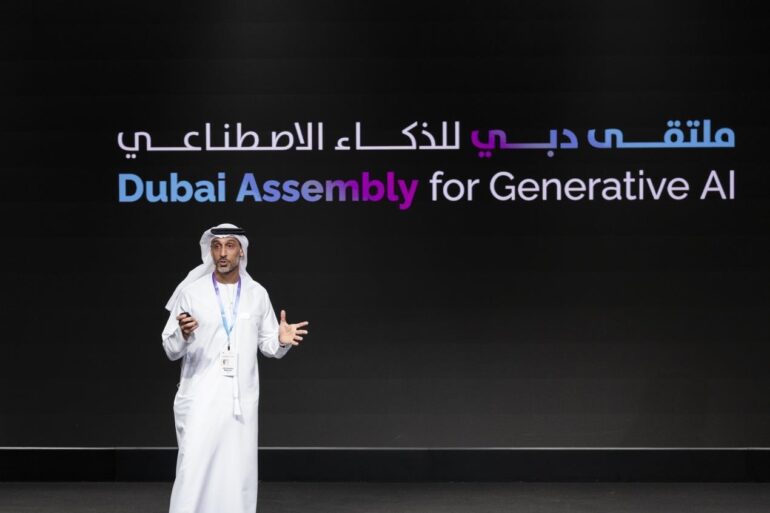TL;DR:
- UAE’s AI Minister urges global consensus on AI governance at Dubai Assembly for Generative AI.
- Proposes governing AI use cases, emphasizing practicality over regulating the technology itself.
- Dubai Future Foundation launches Dubai Generative AI Alliance to accelerate tech adoption and innovation.
- ‘Dubai AI’ introduced a generative AI-powered digital city concierge, set to transform government services.
- Experts at the assembly predict a $400 billion benefit to the global banking sector from generative AI.
- Generative AI is expected to automate routine tasks within the workplace within 18-20 months.
Main AI News:
In a recent address at the Dubai Assembly for Generative AI, His Excellency Omar Al Olama, the UAE’s Minister of State for Artificial Intelligence, Digital Economy & Remote Work Applications, called upon nations to expedite the establishment of a global consensus on AI governance. Drawing a parallel to the Paris Agreement, which took several years to formulate and enforce, Al Olama emphasized the need for a swift and innovative approach to AI governance.
He opined that the ongoing global discourse on AI governance appears to be a “non-starter.” Instead of attempting to govern the technology itself, Al Olama proposed a more pragmatic strategy for regulating the various applications of AI. This shift in focus could offer greater flexibility and effectiveness in addressing the multifaceted challenges posed by artificial intelligence.
The Dubai Assembly for Generative AI witnessed the participation of more than 2000 attendees, including prominent representatives from major tech conglomerates and consultancy firms like Microsoft, Deloitte, PwC, and IBM. During this event, the Dubai Future Foundation unveiled the Dubai Generative AI Alliance, a groundbreaking consortium of technology companies dedicated to accelerating the integration of emerging technologies and fostering one of the world’s most advanced and efficient tech-driven governmental systems.
Khalfan Belhoul, CEO of the Dubai Future Foundation, extended an invitation to corporations and innovators to join this alliance, which will be primarily focused on developing innovative technology pilots. Leveraging the capabilities of AI, the metaverse, and Web3, this initiative aims to drive transformative advancements in various sectors.
In another significant development, the Dubai government introduced ‘Dubai AI,’ a generative AI-powered digital city concierge. This city-wide digital platform promises to provide comprehensive information and services across various domains, encompassing health, business, and education. It is poised to revolutionize government services, creating a more efficient and accessible experience for both residents and visitors.
The assembly also featured discussions on the potential impact of generative AI on the global banking sector. Experts from leading international tech corporations and consultancies shared insights, with PwC highlighting the imminent arrival of automation in workplaces. Within the next 18-20 months, generative AI is expected to execute routine tasks, such as booking flights and generating reports, on a large scale.
Deloitte’s foremost digital expert predicted that generative AI would significantly benefit nuclear fusion, climate action, and drug discovery. Among the early adopters of this emerging technology, the industrial and pharmaceutical sectors are poised to reap substantial rewards.
Emirates’ Chief Operating Officer, Adel Al Redha, also announced plans to empower cabin crew with generative AI capabilities through comprehensive training by November. This move underscores the airline industry’s commitment to harnessing AI’s potential for enhanced services and efficiency.
Conclusion:
The UAE’s call for accelerated AI governance and the launch of the Dubai Generative AI Alliance signal a significant push towards embracing emerging technologies. The introduction of ‘Dubai AI’ underscores the commitment to enhancing government services. With experts foreseeing substantial benefits, the market should anticipate transformative changes across various sectors, including banking, as generative AI gains traction in the near future.

